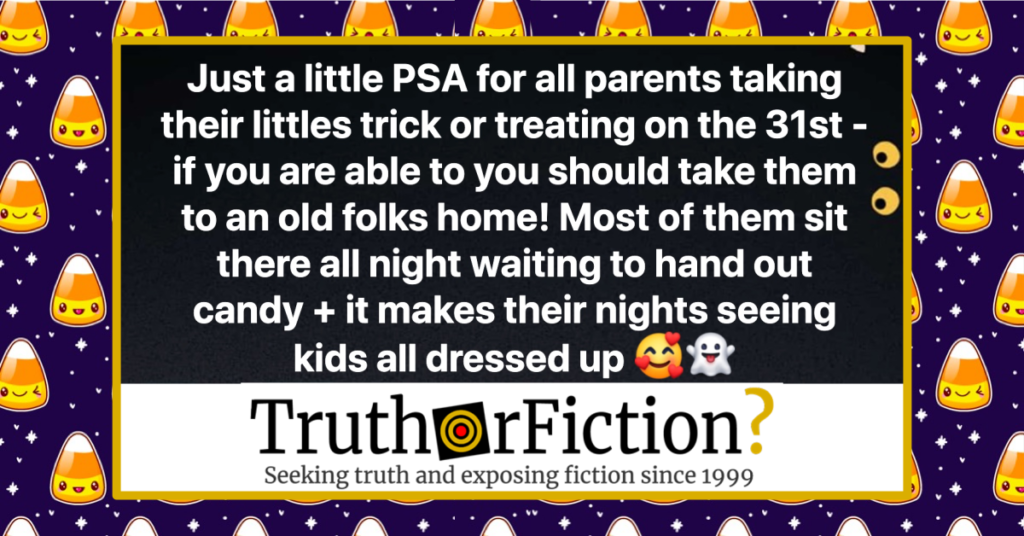On October 27 2019, the Facebook page “Mommy&Kids” shared a status update meme against a spooky-themed background, advising parents of “littles” to spend some of their Halloween evening trick-or-treating at an “old folks home”:
It appeared the page swiped the status update from Facebook user Brittany Desgagne’s identical October 26 2019 post. She originally wrote:
Just a little PSA for all parents taking their littles trick or treating on the 31st – if you are able to you should take them to an old folks home! Most of them sit there all night waiting to hand out candy + it makes their nights seeing kids all dressed up ????????
Desgagne’s post was shared over 10,000 times, and the copy nearly 60,000 times — meaning tens of thousands of people were not only exposed to the “old folks home” trick-or-treating tip, but that they passed it on. At least one commenter was aware that the idea might not be as practical as it seemed on first glance. They advised commenters and sharers: “Check with the homes first.”
On paper, and on social media, the idea looks like an ideal effort, combining one widespread American tradition (trick-or-treating) with a seemingly kind twist (visiting people in assisted living facilities, whose days might be lonely and boring without visits.) The user even said that spontaneous trick-or-treaters “makes their nights” and the residents like seeing the “kids all dressed up.”
We checked the news to see if any assisted living facilities had invited trick-or-treating or hosted Halloween events, locating two stories from Michigan about events specifically scheduled in October 2019.
The first was headlined “Assisted living center invites children for early trick-or-treating,” noting that “hundreds of grandchildren and great grandchildren dressed in costumes and prowled the halls of the Sheldon Meadows Assisted Living Center” on October 25 2019. No mention was made of an open invite for the Halloween night (October 31), or allowing trick-or-treaters unknown to the residents to roam the halls asking for candy.
In another article, a local news organization reported on a scheduled event open to the community on October 27 2019:
Residents at Lakeview Assisted Living in Gladstone celebrated Halloween on Sunday with their first-ever trick-or-treating event.
Dressed in their costumes, residents and staff greeted families and children at the door with tons of candy.
The goal was to make the event fun for both residents and the community.
Staff at Lakeview say these events are important, since it allows residents to interact with the community.
A senior living facility in Wisconsin invited local children to attend an event on October 29 2019, adding that all who wished to attend were required to RSVP, not just show up in costume. Again, that event was not held on Halloween. On October 14 2019, KTRK in Texas reported that a senior facility in Webster requested candy donations for trick-or-treaters invited to the facility, but the report didn’t say whether the candy was intended for Halloween itself or a separate event.
The existence of scheduled events did not preclude facilities opening their doors and hallways to trick-or-treaters and their parents on Halloween itself, although we found no similar invitations for day-of events at facilities. The events we did uncover were typically a) not on Halloween and b) spanned periods as short as an hour, likely to avoid fatiguing elderly residents.
We called several assisted living facilities to ask whether they were equipped to handle groups of children on Halloween day or night. An employee at the first had never heard of the facility being open to trick-or-treaters, and seemed perplexed at how such an event might work. It did not seem that residents were equipped with candy to pass out to visiting children, and it further seems unlikely that it had accepted such visits on previous Halloweens.
At the second facility, a director indicated that the described activity would need to be scheduled and planned, and that no such plans existed for Halloween in 2019. At all facilities we called, people answering the phone were surprised by the online rumor, and it seemed that they were not prepared to handle groups of children wishing to visit individual residents for candy on Halloween.
With this information in mind, the post advising parents of “littles” to take their costumed children to “old folks homes” to the delight of residents seems both well-meaning and naive. As a concept, it seems to be a kindness. But in actuality, we found a handful of planned events of that nature, and we were unable to find any assisted or senior living facility equipped to handle an influx of excited costumed trick-or-treaters throughout the day and night on Halloween.

